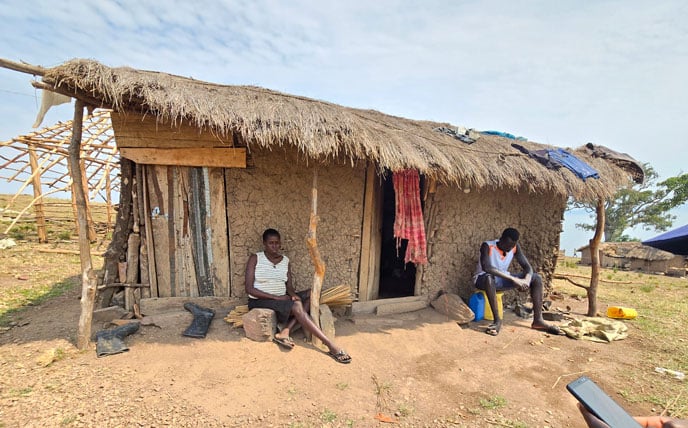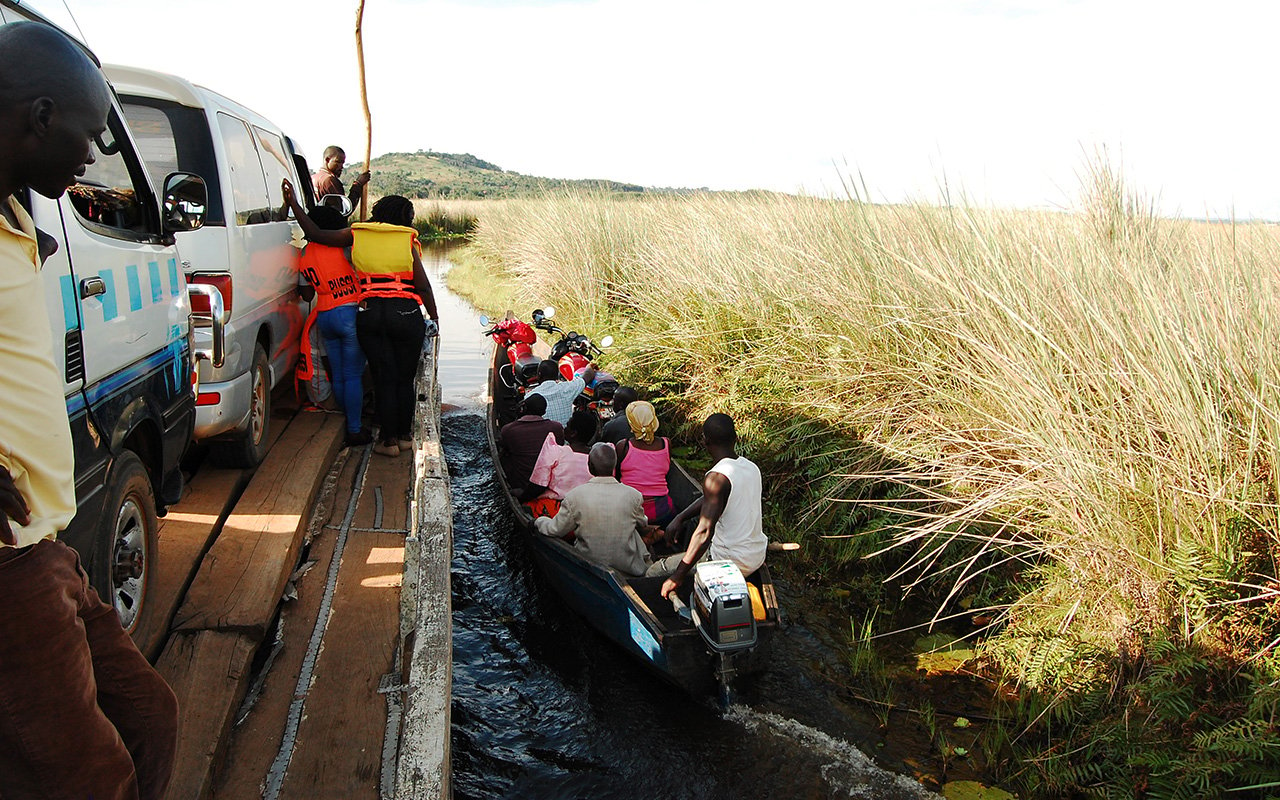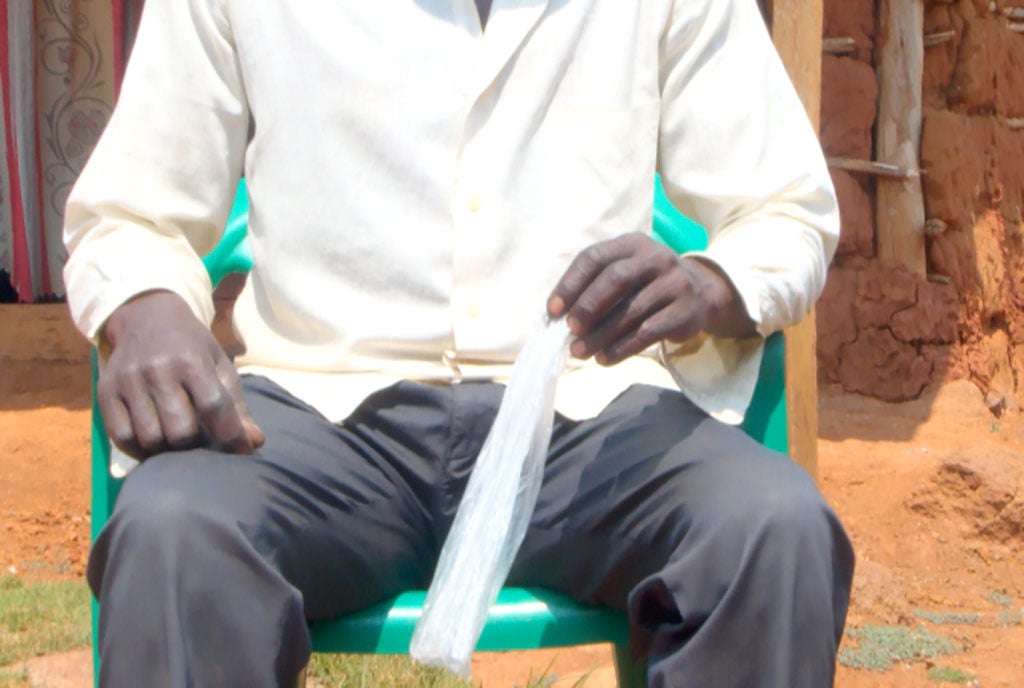Prime
The scandal of poverty on Uganda’s islands

Patrick Ogwang, whose wife is pregnant with her third child, says besides saving fuel, one has to pray that on the day the labour pangs begin, the weather is perfect. Photos | Jessica Sabano
What you need to know:
- Living on an island can make one feel isolated from the world, as access to health and social services is difficult due to the high transport costs. In this story from Mpuga Island, Jessica Sabano writes that glaring gaps in health care provision and sanitation services are putting the lives of many at risk.
The lack of a health centre, clinic or drug shop on Mpuga Island in Buvuma District can be a death sentence. To dodge the Angel of Death, one has to stock up on petrol and sometimes, drugs whose life span is unknown, and hope that in the hour of need, a boatman will be found to transport you to the next island to access healthcare.
That is Zulaika Namukose’s fervent prayer. At 26, she is seven months pregnant with her third child. So far, she has stocked 10 litres of petrol in her house. She hopes to have collected a least 15 litres by the time she is due for delivery.
“There is public transport; a boat to Kiyindi Landing Site, which costs Shs10,000 per trip. However, I would not advise a heavily pregnant woman to use a public boat because it carries as many as 30 people. And it is a two-hour journey. The space is not enough for one to stretch or sit comfortably,” she says.
The 10 litres she has collected will be used in a private wooden boat she hopes to hire.
“Travelling on water is costly. The moment you learn you are pregnant, you also need to start saving fuel and hire a boatman in advance. I know of women who have died on the boats as they were being transported to hospital and those who have died at home as people were running around looking for a boatman to transport them,” she adds.
Patrick Ogwang, whose wife is also pregnant with her third child, says besides saving fuel, one has to pray that on the day the labour pangs begin, the weather is perfect.
“Every month, I set aside a small amount. During the day, the boat can use 10 litres of fuel, but during bad weather, this can rise to 20 litres because the wind usually blows the boat off course. You can wander on the lake for hours, thinking you are going to die,” he says.
On the day Daily Monitor visited Mpuga Island, Lake Victoria was calm, but we were informed that the weather can change at a moment’s notice.
“If on my wife’s due date, the winds rise, we will postpone the journey to the landing site because no boatman will risk thier life for us. But when have labour pains ever waited for perfect conditions?” Ogwang asks.
On the side, Ogwang’s wife, Jackline Anguma, is saving some money to offer the midwives at the health centre so that they can attend to her the moment she arrives.
“I have been receiving antenatal services at the health unit on Kiyindi Landing Site. The nurses usually ask for Shs10,000 on the side to attend to me. I cannot imagine what they will ask for when I go to deliver the baby,” she says.
Fatal delays in accessing obstetric care
The Three Delays Model identifies several access barriers to obstetric care in low- and middle-income countries. The model proposes that maternal mortality is overwhelmingly due to delays in deciding to seek medical care and failure to reach a health centre on time.
The third delay involves failure to receive adequate care when a pregnant woman reaches the health centre due to lack of medical supplies and poorly motivated medical staff. All the three delays are present on Mpuga Island.

Zulaika Namusoke who is seven months pregnant has so far stocked 10 litres of fuel to help with travels to a health centre when labour starts.
Buvuma District has 52 islands and 12 health facilities, serving an estimated population of more than 145,000. However, only nine islands enjoy these facilities. District statistics show that only 32 percent of expectant mothers deliver at 12 health facilities.
The nearest health facility to Mpuga Island is Namatale Health Centre III on another island. On a day with perfect weather, a one-way boat ride from Mpuga to Namatale costs Shs50,000.
Paul Ssempijja, the LC1 chairperson of Mpuga Island, says while the public boats may be of help to those who cannot save fuel for a private boat, they work on a schedule.
“The boat cannot wait for latecomers. When it leaves, we have no option but to mobilise funds from the islanders to hire a boat to transport a woman in labour. I always advise women who are seven to eight months pregnant to go and stay with relatives on an island that has health facilities to avoid last-minute inconveniences,” he says.
Ssempijja adds that while birth attendants are the first point of call, in other parts of the country, there are none on the island.
“When a woman goes into labour before we can arrange transport, the islanders gather and try to help her, as we make calls to any village health team member on the nearby islands to come and save her life. Sometimes, we fail to cut the baby’s umbilical cord,” he says.
There are two village health team members on Mpuga Island. Doreen Alupo, a midwife at Namatale Health Centre III, says every month, 30 women deliver at the health facility.
“240 pregnant women turn up for antenatal services per month, but only 30 return to give birth here. Very few of them are from Mpuga Island. Sometimes, when we need to refer a patient to a higher facility and the family does not have money, health workers contribute towards hiring a wooden boat,” she says.
Although the facility has three midwives, there is a lack of medical equipment. For instance, the surgical trolley is incomplete and men and women share the same ward, which has only five beds.
Overwhelmed
Isa Mbooge, the chief administrative officer of Buvuma District, says the challenge in healthcare provision is the constant inflow of newcomers from neighbouring countries.
“This being an island district, people migrate constantly and our resources are greatly strained. We are upgrading Namatale Health Centre III to increase the number of staff and include a medical doctor. However, there is a need for a health facility on Mpuga Island because transport to other islands is costly,” he says.
Dr Baker Kanyike, the district health officer, says the island does not have land ambulances to ferry patients to higher facilities.
“We realise there should be a clear and programmed referral system from the water bodies to regional referral hospitals because there is none at the mainland shores. The government gave us a boat ambulance but there is no land ambulance to ferry patients from Kiyindi Landing Site to (National Referral Hospital) Mulago or Jinja (Hospital). It takes about five hours to get an ambulance from Jinja or Naguru (China-Uganda Friendship Hospital) and this cost lives,” he says.
Dr Kanyike adds that the lack of financial support has also curtailed the activities of the district’s health sector.
“We requested the Ministry of Health to provide protective gear such as life jackets and to budget for a monthly allowance of Shs150,000 for every VHT member for motivation. We are yet to receive a response. We also appealed to Buvuma Local Government for financial support to meet fuel costs. The district approved Shs1m per year for the health department, which is minimal, given that a single voyage to the furthest island costs Shs1.5m in fuel,” he decries.
Open air defecation the norm
Despite being located on Lake Victoria, access to clean and safe water is a distant dream to residents of Mpuga Island, which does not have a single latrine. Anne Nekasa, a resident, says this situation has exposed them to the risk of waterborne diseases such as typhoid, cholera, dysentery and bilharzia.

“We all defecate in the bush. When it rains, the waste is washed into the lake, where we fetch water for cooking, drinking and washing clothes. Some people go straight to the lake and defecate in the water. When I go to fetch water and find feaces on the shore, I walk deeper into the lake and dip my jerrycan there,” she says. Nekesa, who admits to contracting typhoid often, says she rarely boils the water she and her family drink.
“Once a baby begins walking, the first lesson they are taught is where to go in the bush to defecate so that the parents are not overwhelmed with cleaning the waste in the house. However, on hot days, snakes come out of the bush looking for cool shelter and several people have been bitten while defecating,” she says.
In the dry season, when the bushes dry up, there is no privacy. People see each other going about their business. Residents told Daily Monitor that each person has a specific area mapped out in the bush. The open-air ‘toilet’ is wide enough to accommodate everyone on the island.
“The problem comes when someone encroaches on another person’s territory. You have no choice but to add onto what the encroacher has left and pray for the rain to come and wash it all away. For women, this is very unhealthy and exposes us to the risk of contracting infections,” Nekesa adds.
Ssempijja says it is very expensive to transport building materials to the island to construct a communal pit latrine.
“Building a latrine may cost Shs10m. We tried to mobilise residents to pool funds for the construction of a latrine but our efforts were not successful. Every resident was supposed to pay Shs10,000 per year but some people failed to contribute, saying they are not permanent residents and they see no need to build a latrine,” he says.
Sandy soils and rocky terrain have also been blamed for the lack of toilet facilities not only on Mpuga, but on other islands in the district as well.
Robert Migadde, the area Member of Parliament, says besides the lack of toilets, the most pressing challenge is that people do not know how to use them.
“There are no mechanisms for the local government to enforce toilet use. If there were bylaws to that effect, private players would have come in a long time ago to construct latrines because this is also a business venture. Some fishermen believe if they use toilets, they will not catch fish,” he says, citing the example of a public toilet in Buvuma Town Council which fishermen have refused to use.
In March this year, the Ministry of Health launched a Shs19b three-year project to address open defecation and poor sanitation in the seven districts of Buikwe, Buyende, Kabarole, Kamuli, Kayunga, Luuka, and Kole, targeting 2,351,440 people. Unfortunately, Buvuma is not among the seven districts.
Sustainable Development Goal (SDG) Six aims at ensuring access to safe water, hygiene and sanitation for all, which are the most basic human needs for health and wellbeing. However, according to the SDG Global Index, Uganda has stagnated on SDG Six.
Some of the targets of SDG Three are that by 2030, the global maternal mortality ratio will have been reduced to 70 per 100,000 live births and that there will be universal access to sexual reproductive health services and the integration of reproductive health into national strategies and programs.
The SDG Global Index shows that Uganda has moderate performance on SDG Three.
The cost
Buvuma District has 52 islands and 12 health facilities, serving an estimated population of more than 145,000. However, only nine islands enjoy these facilities. District statistics show that only 32 percent of expectant mothers deliver at 12 health facilities.
The nearest health facility to Mpuga Island is Namatale Health Centre III on another island. On a day with perfect weather, a one-way boat ride from Mpuga to Namatale costs Shs50,000.
What they say
“There are no mechanisms for the local government to enforce toilet use. If there were bylaws to that effect, private players would have come in a long time ago to construct latrines because this is also a business venture. Some fishermen believe if they use toilets, they will not catch fish,” says Robert Migadde, the Member of Parliament for Buvuma Islands County.
“Travelling on water is costly. The moment you learn you are pregnant, you also need to start saving fuel and hire a boatman in advance to be on the safe side. I know of women who have died on the boats as they were being transported to hospital and those who have died at home as people were running around looking for a boatman to transport them,” says Zulaika Namusoke, resident and expectant mother.




